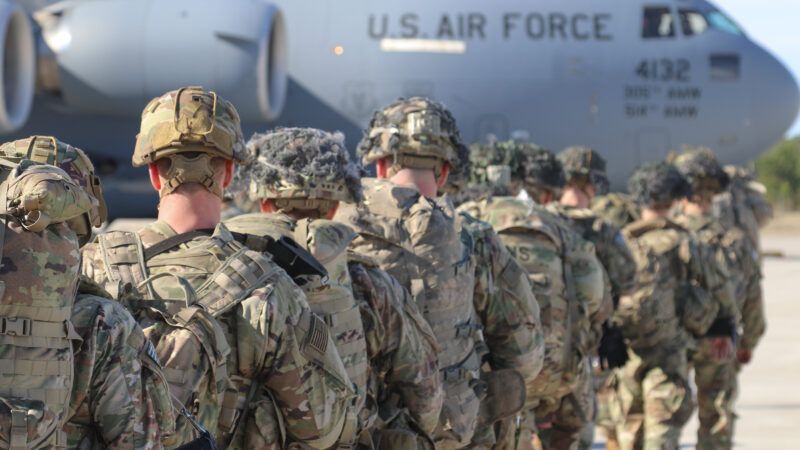On Paper, Biden Is Ending the U.S. Combat Mission in Iraq. He's Actually Leaving American Troops in Danger.
Saying that American troops are in Iraq for "training and advising" and not "combat" might sound nice, but it doesn’t get them out of harm’s way.

In a meeting with Iraqi Prime Minister Mustafa al-Kadhimi on Monday, President Joe Biden announced that the U.S. combat mission in Iraq would draw to a close by the year's end. At face value, the move sounds much like Biden's push to withdraw all American troops from Afghanistan by August 31.
But the devil's in the details, and a closer look reveals that these troops won't be leaving Iraq. Rather, the Pentagon and other administration officials say they will remove a small number of the 2,500 American soldiers in Iraq, and will reclassify on paper the roles of those who remain. They won't be fighting anymore; they'll be "training and advising" the Iraqi Security Forces. When quizzed, White House Press Secretary Jen Psaki wouldn't say how many American troops would stay in Iraq—signaling that there may not even be a meaningful drawdown, let alone a full departure.
What could've been a promising end to another bloody theater of U.S. involvement in the Middle East is actually an anticlimactic maintenance of the status quo. Held against Biden's Afghanistan withdrawal, the Iraq option seems even less sensible. If the president feels it's time for Afghans "to decide their future and how they want to run their country," and if he questions the sense in leaving American troops in Afghanistan where their lives are at risk, why isn't he applying that logic to Iraq?
Dan Caldwell, senior adviser to Concerned Veterans for America and himself a veteran of the Iraq War, says an American troop presence in Iraq "is not required for our safety or conditions or prosperity," nor will it "fundamentally alter the direction in which Iraq is heading."
American troops began fighting the Islamic State in Iraq and Syria in 2014, leading to the group's territorial defeat in 2019. The New York Times reports that U.S. officials maintain "there are no combat troops" in Iraq, but concede that "a small number of U.S. Special Operations Forces serving as advisers and trainers occasionally accompany Iraqi counterterrorism forces on combat missions against Islamic State fighters." Beyond this, proponents of involvement say the U.S. needs to counter the threats of Iran and Iran-backed militias. The mission isn't yet over, and the U.S. has invested so much money and manpower up to this point, so it's too soon for American forces to fully depart. So goes the forever war logic, and so goes the justification for staying entangled in Iraqi affairs.
Caldwell notes that leaving American boots on the ground, no matter the capacity they nominally fill, means putting them in harm's way. "American service members in Iraq will still likely be attacked frequently by rockets fired by Iraqi militias," he says, which "will not…make the distinction between combat and non-combat troops and will continue to view American forces in the country as easy targets."
"When I left Iraq from Al Asad Airbase in 2009," Caldwell continues, "the feeling was that the war was over and that we would not be in the country much longer. However, 12 years later, there are still American troops at Al Asad and they are under frequent attack."
Rockets hit the base in early July, proving that maintaining even a small U.S. troop presence in Iraq—reduced drastically from a December 2007 peak of 170,000 soldiers—carries risks. Though no American soldiers were injured or killed in that attack, it's only a matter of time before they are. Those lives are just as worth preserving as the troops coming home from Afghanistan, even if on paper they're not engaged in combat. To hostile parties in the Middle East, that distinction will mean nothing.


Show Comments (26)